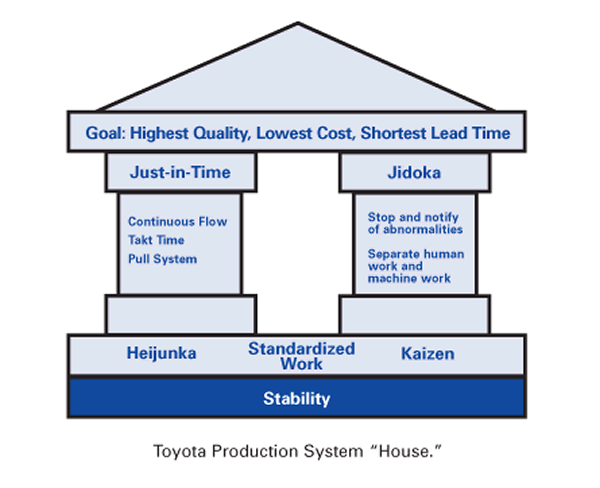Toyota Production System
The production system developed by Toyota Motor Corporation to provide best quality, lowest cost, and shortest lead time through the elimination of waste. TPS is comprised of two pillars, just-in-time and jidoka, and often is illustrated with the “house” shown at right. TPS is maintained and improved through iterations of standardized work and kaizen, following PDCA, or the scientific method.
Development of TPS is credited to Taiichi Ohno, Toyota’s chief of production in the post-WW II period. Beginning in machining operations and spreading from there, Ohno led the development of TPS at Toyota throughout the 1950s and 1960s, and the dissemination to the supply base through the 1960s and 1970s. Outside Japan, dissemination began in earnest with the creation of the Toyota- General Motors joint venture—NUMMI—in California in 1984.
The concepts of just-in-time (JIT) and jidoka both have their roots in the prewar period. Sakichi Toyoda, founder of the Toyota group of companies, invented the concept of jidoka in the early 20th Century by incorporating a device on his automatic looms that would stop the loom from operating whenever a thread broke. This enabled great improvements in quality and freed people to do more valuecreating work than simply monitoring machines for quality. Eventually, this simple concept found its way into every machine, every production line, and every Toyota operation.
Kiichiro Toyoda, son of Sakichi and founder of the Toyota automobile business, developed the concept of JIT in the 1930s. He decreed that Toyota operations would contain no excess inventory and that Toyota would strive to work in partnership with suppliers to level production. Under Ohno’s leadership, JIT developed into a unique system of material and information flows to control overproduction.
Widespread recognition of TPS as the model production system grew rapidly with the publication in 1990 of The Machine That Changed the World, the result of five years of research led by the Massachusetts Institute of Technology. The MIT researchers found that TPS was so much more effective and efficient than traditionalmass production that it represented a completely new paradigm and coined the term lean production to indicate this radically different approach to production.
